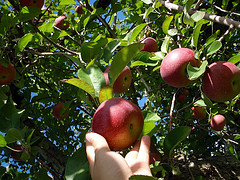 If you’re a regular reader of my blog, you know I’m a fan of leveraging every information resource available to me – my internal ATS/CRM, the Internet, LinkedIn, Facebook, Twitter, and yes, even job board resume databases (gasp!).
If you’re a regular reader of my blog, you know I’m a fan of leveraging every information resource available to me – my internal ATS/CRM, the Internet, LinkedIn, Facebook, Twitter, and yes, even job board resume databases (gasp!).
Have you ever heard job board naysayers refer to the resumes you can find on Monster, Dice, Careerbuilder, Hotjobs, etc. as the equivalent of “low hanging fruit?”
I know I have – MANY times. When I hear people say it or read people write it, it always seems to be used with a negative connotation, and sometimes with derision.
Is “low hanging fruit” intrinsically a bad thing? Is it even an accurate way to describe searching for resumes on the job boards?
From what I can tell, “low hanging fruit” is a concept most people understand because they’ve heard others use it in context. But what does such a statement actually mean? In this article, I will show you there are at least a few different takes on the meaning and use of the phrase and you may be surprised at what actually fits the bill as low hanging fruit in recruiting.
Low Hanging Fruit Defined
Encarta’s dictionary defines the phrase “low hanging fruit” as “a simple problem or target: a target that is easy to achieve, or a problem that is easy to solve.”
Okay – that definition makes some sense. We can safely assume that the phrase comes from the fact that fruit bearing trees have some branches that are low enough to the ground for people to reach some fruit without much effort.
If the problem or target is acquiring fruit, then certainly the easiest solution that requires the least amount of effort is picking the fruit that is easily within reach.
However, does it accurately describe searching for resumes on the job boards, or anywhere else for that matter?
I don’t think so.
If a recruiter’s target or the solution to their problem is simply to find *SOME* resumes, then ANY source of resumes can be called “low hanging fruit” because they can easily be found on the Internet, LinkedIn, and (hopefully) in your internal resume database.
But is there a tree that *ONLY* has low hanging fruit? And can we be assured that the best fruit will always be within easy reach?
No.
High Hanging Fruit
In the real world, trees don’t only bear low hanging fruit that’s easy to reach. On any given fruit tree, there is a mix of easily accessible (low hanging) and hard to get (top of the tree) fruit.
Similarly, while some candidates contained in the resume databases of the job boards may in fact be “low hanging fruit” (easy to find and aquire), there are many candidates that are what I would refer to as “high hanging fruit” – not to so easy to find and acquire. In fact, some are practically impossible for some people to find without the right tools and training.
To say that ALL of the resumes that you can find on Monster or other job board resume databases are all “low hanging fruit” is to demonstrate a fundamental lack of knowledge and comprehension of Talent Mining – leveraging information systems for Talent Identification.
Access vs. Ability
To the average sourcer or recruiter, perhaps the job boards appear to only have low hanging fruit – because that is all they are capable of seeing. However, just as there is fruit at the top of every tree that you can’t see from the ground, I am here to tell you there are resumes/candidates in every database (even your own!) that are hidden from plain sight.
I often refer to these resumes/candidates as Hidden Talent Pools – but for the sake of this article, I’ll refer to them as “high hanging fruit.”
Just because you have ACCESS to an orchard, it does not necessarily imply you have the ABILITY to reach all of, or the best fruit available within in the orchard.
Competition
The BNET business dictionary goes one step further in explaining the concept of low hanging fruit: “Low-hanging fruit is highly visible, easily obtained, and provides good short-term opportunities for profit. Such fruit must be taken advantage of quickly, because it is accessible to anyone and there might be considerable competition.”
Okay – I can see how people apply this concept to resumes on the job boards. The job boards are certainly “highly visible,” some resumes are easy to obtain, and if many people have access to the major job boards, then there is an increased chance that other people may find and contact candidates before you do, so you need to act fast.
However, if you take a closer look at BNET’s definition, it says “because it is accessible to anyone.” The last time I checked, everyone doesn’t have access to the premium job boards. In fact, many complain about how expensive they are and offer the cost as a reason why they don’t use them. While there is undoubtedly the threat of competition over each and every resume on the job boards, the job boards don’t actually fit this particular definition of the phrase “low hanging fruit” because they are not accessible to anyone/everyone.
LinkedIn and the Internet
If we choose to go with BNET’s definition of low hanging fruit, Internet resumes and LinkedIn profiles (many of which as just as detailed as resumes) are more accurately described as low hanging fruit than job board resumes because literally ANYONE can access them.
There are over 500,000 recruiters on LinkedIn – but you don’t even need to have a LinkedIn profile to search for and find candidates on LinkedIn. So when it comes to easy, unadulterated access to resumes over which there is much competition (whether you are aware of it or not) – the Internet and LinkedIn fit the bill.
Your Own ATS/CRM
Encyclopedia.com has a slightly different take on the definition of low hanging fruit: “a thing or person that can be won, obtained, or persuaded with little effort: we know mining our own customer base is low-hanging fruit.”
Now that’s a whole new angle, and quite interesting! From this perspective, mining your own private/internal resume database for candidates would in fact be the very definition of low hanging fruit.
Referrals and Networking
Going with a mix of Encarta’s and Encyclopedia.com’s definitions, it becomes easy to see that leveraging your personal and professional network when attempting to identify candidates is low hanging fruit.
Can anything be easier than networking with people you’ve already established relationships with? While there is definitely room to apply skill in your networking efforts, it’s actually other people doing the work (finding/identifying people) for you. And if someone in your network refers you a candidate, in my experience, it often doesn’t take as much “persuasion” or actual recruiting.
The Lowest Hanging Fruit
To find the lowest hanging fruit of all, I believe one need look no further than job postings. When it comes to identifying candidates, people responding to your postings are the fruit that’s fallen off of the tree and are lying on the ground.
Looking back at all 3 takes on the meaning of the phrase “low hanging fruit,” if your goal is to get resumes, then it doesn’t get any better than the resumes coming to you, rather than you having to go out and actually look (search) or ask (networking/referrals) for them.
And it’s probably a good idea to act fast on candidates responding to your job postings, because if they are responding to yours, they are probably responding to others – which can result in competition. Lastly, posting your job on your corporate site, the boards, LinkedIn, your Facebook fan page, and Twitter is a no brainer – it’s easy, logical, and no one should have to persuade you to do this.
Conclusion
The next time you use or hear someone use the phrase “low hanging fruit” when it comes to sourcing and recruiting, I hope you will pause and consider the real meaning of the concept.
The joke’s on those who use it to derisively describe searching for candidates on the job boards, because using the Internet, LinkedIn, networking, referral recruiting, and posting jobs to find candidates can ALL be accurately described as “low hanging fruit.”
While searching resume databases (internal or online) can seem easy and can yield some “low hanging fruit,” it is critical to realize that no tree bears only fruit within easy reach. While some are content to fill their basket with the low hanging fruit which requires little effort and skill to collect, those who are especially talented at searching information systems can make the conscious decision to avoid the low hanging fruit, break out a ladder, and head straight to the top of the tree to find and acquire that which others can’t – either due to inability or to the fact that they don’t even “see” them up there at the top.
Access neither implies nor confers ability. Just some food (fruit) for thought.
